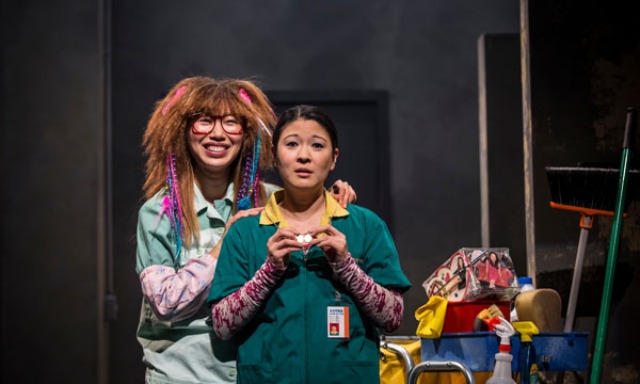A Singular View Of Modern China In ‘Extreme Happiness’
By Melody Udell in Arts & Entertainment on Sep 30, 2014 4:05PM

'The World of Extreme Happiness' at the Goodman. Photo by Liz Lauren.
Cynical titles aside, Frances Ya-Chu Cowhig’s portrayal of modern China in The World of Extreme Happiness is a bleak one. Her heroine, Sunny Li (Jennifer Lim) is a determined 18-year-old from the countryside transplanted into one of China’s newly minted metropolises, where she works as a janitor and hopes to move up the ranks into a coveted office job. But unrelenting circumstances keep Sunny from achieving her goal, and Cowhig puts Sunny’s suffering on full display in an attempt to build a human portrait around China’s economic revolution. It’s a lofty goal, for sure, but it requires a more sure-footed, focused script and deeper characters before it can truly shed light on the exploits of China’s rural poor.
Sunny was confronted with her first of many problems right at birth: she’s a girl. Once she was born and didn’t turn out to be the longed-for son, Sunny’s rural parents dropped her into a pig-slop bucket to die, like the four baby girls that came before her. Somehow, though, Sunny survived and helped raise her little brother once their mother died. Left only with a father who cares more for his racing pigeons than his children, Sunny began sending money home from her janitorial factory job to help fund her brother’s education.
Cowhig’s motives here are clear—Sunny, aware of the fact that her own parents didn’t want her at birth, has forged ahead to climb, bit by bit, out of the poverty in which she was born. But instead of focusing on Sunny’s dogged perseverance in the face of adversity, Cowhig leads the audience into an underdeveloped subplot involving a “ghost marriage” to Sunny’s dead neighbor who was killed for protesting working rights in Beijing.
Sunny’s second problem, according to her ebullient coworker Ming-Ming (Jo Mei, in an unfortunately stereotypical role), is that she doesn’t demand what she wants. Latching onto Ming-Ming’s advice, Sunny begins attending pep-rally-like self-help talks by TV evangelist Mr. Destiny. Feeling empowered, she makes her case for a promotion and is almost immediately denied by the factory supervisor, who advises her to “keep her aspirations low and her expectations even lower.” Only when Sunny resorts to a spontaneous sex act does she get the promotion. Cowhig, rather than exploring the solutions for migrant workers to get ahead—whether it’s education or developing new skills or fighting for rights—presents a more complicated, insular view by using Sunny as the face of China’s changing economic atmosphere. We don’t quite see how a conflicted Sunny is truly grappling with what it means to better yourself in a society that doesn’t value your contribution.
As Sunny, Jennifer Lim does what she can with a somewhat underdeveloped character. She’s capable of showing moments of steely reserve—a teenager who doesn’t have the luxury of dealing with typical teenage problems. But it isn’t until Sunny vies to be the “face of the factory” in a documentary produced by Chinese businesswoman Artemis (Jodi Long) that she truly finds her voice. Artemis, too, is given an underdeveloped plot line. She’s kidnapped and interrogated by Chinese officials who think her documentary is going to be sympathetic toward migrant workers. She makes her case that the film is simply propaganda, a device to show how factory workers are happy that they’ve escaped their poor rural towns, but it’s unfortunate that this bit of context wasn’t fully fleshed out.
Cowhig’s play is at its best when various characters, beaten down by the day-to-day hardships that’s required of China’s migrant working class, exposit passionately on the rapid changes that have propelled the country into its current state. Sunny is supposed to be the working class hero, but instead, it’s the supporting characters who etch a deeper impression.
The show runs through Sunday, Oct. 12 at the Goodman, 170 N. Dearborn, 312-443-3800 or online.